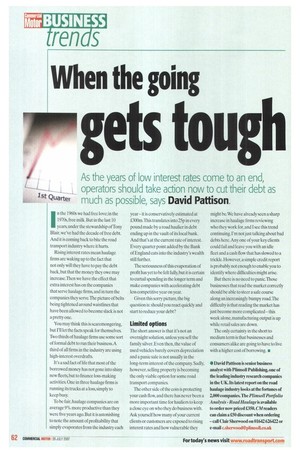When the going
Page 62

If you've noticed an error in this article please click here to report it so we can fix it.
ets tough
As the years of low interest rates come to an end, operators should take action now to cut their debt as much as possible, says David Paftison.
In the 1960s we had free love; in the 1970s, free milk. But in the last 10 years,under the stewardship of Tony Blair, we've had the decade of free debt. And it is coming back to bite the road transport industry where it hurts.
Rising interest rates mean haulage firms are waking up to the fact that not only will they have to pay the debt back, but that the money they owe may increase.Then we have the effect that extra interest has on the companies that serve haulage firms, and in turn the companies they serve.The picture of belts being tightened around waistlines that have been allowed to become slack is not a pretty one.
You may think this is scaremoiagering, but I'll let the facts speak for themselves. Two thirds of haulage firms use some sort of formal debt to run their business.A third of all firms in the industry are using high-interest overdrafts.
It's a sad fact of life that most of the borrowed money has not gone into shiny new fleets, but to finance loss-making activities. One in three haulage firms is running its trucks at a loss, simply to keep busy.
To be fair, haulage companies are on average 9% more productive than they were five years ago. But it is astonishing to note the amount of profitability that simply evaporates from the industry each year— it is conservatively estimated at £300m.This translates into 25p in every pound made by a road haulier in debt ending up in the vault of its local bank. And that's at the current rate of interest. Every quarter point added by the Bank of England eats into the industry's wealth still further.
The seriousness of this evaporation of profit has yet to be felt fully, but it is certain to curtail spending in the longer term and make companies with accelerating debt less competitive year on year.
Given this sorry picture, the big question is: should you react quickly and start to reduce your debt?
Limited options The short answer is that it's not an overnight solution, unless you sell the family silver. Even then, the value of used vehicles barely covers depreciation and a panic sale is not usually in the long-term interest of the company. Sadly, however, selling property is becoming the only viable option for some road transport companies.
The other side of the coin is protecting your cash flow, and there has never been a more important time for hauliers to keep a close eye on who they do business with. Ask yourself how many of your current clients or customers are exposed to rising interest rates and how vulnerable they might be. We have already seen a sharp increase in haulage firms reviewing who they work for, and I see this trend continuing. I'm not just talking about had debts here. Any one of your key clients could fail and leave you with an idle fleet and a cash flow that has slowed to a trickle. However, a simple credit report is probably not enough to enable you to identify where difficulties might arise.
But there is no need to panic.Those businesses that read the market correctly should be able to steer a safe course along an increasingly bumpy road.The difficulty is that reading the market has just become more complicated — this week alone, manufacturing output is up while retail sales are down.
The only certainty in the short to medium term is that businesses and consumers alike are going to have to live with a higher cost of borrowing. •
























































































































































































